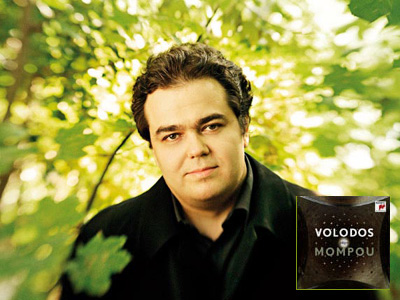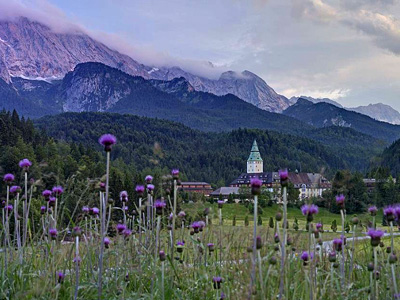
By ANDREW POWELL
Published: December 22, 2013
MUNICH — Somewhere between the patent introspection of his new Mompou CD* and the tags of his early Stateside career — “big bravura pianist,” “new Horowitz” — lies an accurate description of Arcadi Volodos. It may simply be this: German Romantic, as in Schumann and Brahms, with impressionist flair.
That was the take, anyway, from a commanding, technically flawless Bell’Arte recital Dec. 12 here at the Prinz-Regenten-Theater, and it is buoyed by the disc. The 41-year-old pianist from St Petersburg stands distant from the trajectory of his rise: 1998 Carnegie Hall debut, Berlin readings of Rachmaninoff and Tchaikovsky concertos (1999 and 2002). He still plays with strength and vision, but what distinguishes him now is a command of form and the willingness to disturb it in expressive ways.
Stardom, meanwhile, has improbably blurred thanks to the presence of another St Petersburg pianist with what trademark authorities might term a confusingly similar name, Alexei Volodin, 36. (No also-ran, the latter gave a recital himself Dec. 15 at the Mariinsky.) Even so, allegiance to Volodos has held firm, particularly here in Germany, and to its credit his record label Sony Classical has stayed with him.
Schubert’s 1815 C-Major Sonata opened the recital, stitched up with its Allegretto (D279/D346). It seemed a weak choice until Volodos testily hammered and carved his way through, knowing exactly what he wanted from the music. We heard the sound of Beethoven.
The pianist stressed formal commonalities in the standalone pieces of Brahms’s Opus 118 (1893) and allowed contrasts to make their point without emphasis. Full, deep tone colors throughout, and natural lyricism in the framing sections of the A-Major Intermezzo and in the Romance, lent due character. In the final measures of the E-flat-Minor Intermezzo, as poetic cap, Volodos mustered a monumental stillness. (His reported recent success in Brahms’s Second Piano Concerto, with longtime collaborator Riccardo Chailly, is consistent.)
After the break and a fluent Schumann Kinderszenen, Volodos boldly energized the same composer’s C-Major Fantasie (both 1838), its three movements speaking with phenomenal power and passionate unity. For the Finale (Langsam getragen, durchweg leise zu halten), he coaxed a mood of poignant reflection unmatched even by Pollini in the famous 1973 recording (made across town here at the Herkulessaal).
The CD* of miniatures by Federico Mompou (1893–1987), recorded last December in Berlin, is a worthy issue in these times of superfluity. Few distinguished recordings have been made of the Spaniard’s music, and Volodos commits himself intensely to it, judging from his liner essay as well as his playing. Although the output is often related to Satie, Mompou’s late imaginative world (not the style) lies closer to Debussy in his Préludes.
Volodos declares the four Música callada sets (1951, 1962, 1965, 1967) to be peaks of achievement: “ … the music [Mompou] spent all his life moving towards … wrested from eternity, as if it already existed in the Spheres … .” He plays eleven of the pieces, from the total of 28, drawing on all four sets in a sequence his own. This “quietened music” is both abstract and personal, the product of an old solitary man, but not one at death’s door; Mompou lived another twenty years after completing Set 4. Many pieces are “Lento,” a marking that satisfies the composer for divergent exercises in peace (VI), pain and emptiness (XXI), and generalized remoteness or stillness. Others, such as the Moderato XXIV of 1967, flow so plainly and concisely that a marking is hardly needed. The many chilly passages in the Música callada tend to be broken by warm chords in unexpected places.
Volodos revels in the myriad nuances of these valued miniatures and, as in Brahms, downplays contrasts in favor of coherence. He finds fantasy here and there, catches the fleeting moments of excitement, and instantly lets ideas go when they must. The interpretations are light of touch and magical.
Half of the disc holds short independent works, most of them tellingly shaped. In Preludio 12 (1960) and elsewhere, Volodos shows Vlado Perlemuter’s knack for placing just the right weightings in pale adjacent phrases to support a long idea, saving music that could easily sound aimless. The much earlier (1918) Scènes d’enfants suite, home of the cute encore Jeunes filles au jardin, receives an imaginative traversal. Sony’s release is strikingly packaged with photographic details of Antonio Gaudí buildings in Barcelona, the composer’s home town, although typos mar its booklet. The company might now want to entice Volodos into documenting the remaining Música callada.
[*In August 2014 the disc received an Echo Klassik Award.]
Photo © Sony Music Entertainment
Related posts:
Pogorelich Soldiers On
Nazi Document Center Opens
Levit Plays Elmau
Arcanto: One Piece at a Time
Carydis Woos Bamberg


Magelone-Romanzen on Disc
Monday, October 16th, 2017By ANDREW POWELL
Published: October 16, 2017
MUNICH — Sony has released a remarkable recording of Brahms’s Magelone-Romanzen, Op. 33, complete with Zwischentexte prepared by German author Martin Walser. Christian Gerhaher sings the fifteen songs and recites two of the other three poems (the 1st, 16th and 17th) from Ludwig Tieck’s 1797 narrative not set to music. Walser, 87 at the time of the recording, reads his own choice of eloquent, plain words, condensing Tieck’s eighteen-section prose while still advancing the tale and earmarking each song, as Brahms would have expected. Between the two of them, the German language has never sounded more beautiful. Gerold Huber accompanies. Sessions stretched over five days, at Bayerischer Rundfunk here, an indication of the care taken. This 93-minute, 2-CD release, with booklet essay and Romanze texts in German only, has EAN 088985 3110223 and ASIN B01NA7L2AN and must be distinguished from the widely reviewed single-disc issue omitting Walser’s work. Essential listening.
Images © StadtMuseum Bonn, 1865 wood engraving after a drawing (Brahms); 1838 oil on canvas by Joseph Karl Stieler (Tieck); Gregor Hohenberg (Gerhaher); Marion Koell (Huber); Philippe Matsas (Walser)
Related posts:
Fall Discs
Tutzing Returns to Brahms
Time for Schwetzingen
Liederabend with Hvorostovsky
Gergiev, Munich’s Mistake
Tags:Bayerischer Rundfunk, BR Klassik, Brahms, CD, Christian Gerhaher, Commentary, Die schöne Magelone, Gerold Huber, Kritik, Magelone-Romanzen, Martin Walser, Review, Sony Classical, Tieck
Posted in Munich Times | Comments Closed